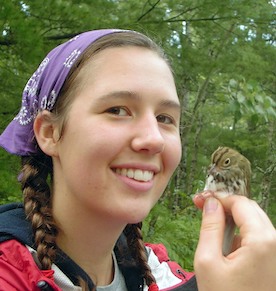Alyssa Borowske’s research culminates in Fulbright scholarship
Science research opportunities at Cornell took Alyssa Borowske around the globe, and her efforts earned her a 2007 Fulbright grant to study the impacts of Australian magpies on native bird species in New Zealand.
“There is simply nothing quite like crawling into a cave which few other humans have ever been inside, or feeling the heart of a Red-tailed hawk beat as you hold it tightly before releasing it back into the sky.”

Her research during her time at Cornell included:
- Collecting stalagmites from a seldom explored Portugese cave, then performing alpha-spectrometry dating and stable isotope analysis with Geology Professor Rhawn Denniston. Her results support a climatic role in observed shifts in the diets of Neanderthals 40-50 thousand years ago.
- Four years of raptor studies with Biology Professor Bob Black culminated in a paper on flocking behavior among raptors. Her data suggests that the species most likely to flock during migration are those whose flight patterns are dominated by soaring and not flapping.
- Capturing, banding, and measuring ovenbirds and red-eyes vireos as part of a nation-wide program to monitor bird populations during a research experience for undergraduates (REU) program at the University of Michigan Biological Station.
- Studying campus sustainability as a Cornell Fellow at the University of South Carolina. For her environmental studies honors thesis, she developed a campus sustainability plan for Cornell that addresses all aspects of campus operations.
Borowske also spent Cornell course blocks studying coral reefs in the Bahamas, ecology at the Wilderness Field Station in northern Minnesota, geology in New Zealand, and Spanish in Guatemala. She majored in biology and environmental studies with a minor in geology.
“Some of my best Cornell memories are from the research I did with faculty members,” she says. “There is simply nothing quite like crawling into a cave which few other humans have ever been inside, or feeling the heart of a Red-tailed hawk beat as you hold it tightly before releasing it back into the sky.”
The experiences also gave her in-depth science skills, and confirmed her interest in science as a career.
“There is a huge difference between reading about science and actually doing it,” she says, “and I found that I love doing science. I was also able to gain self-confidence early in my college career. The faculty members treated me more like a colleague than a student, so the expectations were high, but high goals can be useful for achieving things that you didn’t realize were possible.”
Following her Fulbright year in New Zealand, Borowske intends to pursue a doctoral degree in avian conservation and ecology.



